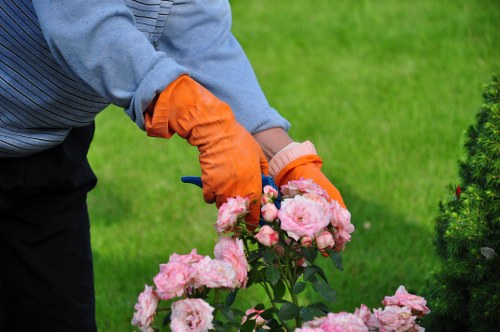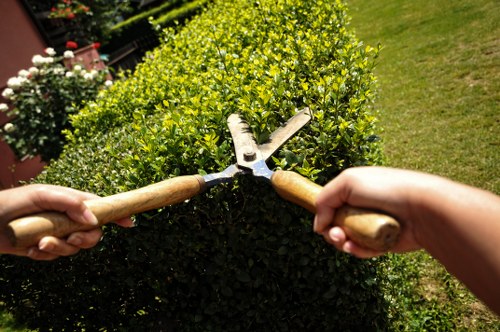Gardening Maintenance: Keeping Your Garden Lush and Beautiful

Garden maintenance is essential for ensuring that your outdoor space remains a vibrant and inviting sanctuary. Whether you're a seasoned gardener or a beginner, understanding the fundamentals of garden care can make a significant difference in the health and appearance of your plants. In this comprehensive guide, we'll explore various aspects of garden maintenance, offering tips and best practices to help you cultivate a thriving garden.
Maintaining a garden involves a combination of regular tasks and seasonal activities. From watering and pruning to fertilizing and pest control, each step plays a crucial role in promoting plant growth and preventing issues. By staying consistent with your maintenance routine, you can enjoy a beautiful garden year-round.
One of the first steps in effective garden maintenance is understanding the specific needs of your plants. Different species require varying levels of sunlight, water, and nutrients. Conducting a thorough assessment of your garden's conditions will help you tailor your maintenance efforts to suit each plant's requirements.

Essential Garden Maintenance Tasks
To keep your garden in optimal condition, it's important to incorporate a range of maintenance tasks into your routine. Here are some of the essential activities that every gardener should consider:
- Watering: Proper watering is fundamental to plant health. Ensure that your plants receive the right amount of moisture, avoiding both overwatering and underwatering.
- Weeding: Regularly removing weeds prevents them from competing with your plants for nutrients and sunlight.
- Pruning: Trimming dead or overgrown branches promotes healthy growth and improves the overall appearance of your plants.
- Mulching: Applying mulch helps retain soil moisture, suppresses weeds, and regulates soil temperature.
- Fertilizing: Providing your plants with essential nutrients supports vigorous growth and flower production.

Seasonal Maintenance Tips
Different seasons bring different challenges and opportunities for garden maintenance. Adapting your care routine to the changing weather can enhance your garden's resilience and beauty.
Spring:
As the weather warms up, it's time to prepare your garden for the growing season. Start by cleaning up any debris from the winter months and preparing the soil for planting. This is also an ideal time to plant new flowers and vegetables.
Summer:
During the hot months, focus on consistent watering and shading to protect your plants from heat stress. Regularly check for pests and diseases, and address any issues promptly to prevent damage.
Autumn:
As temperatures drop, begin to trim back dead foliage and prepare your garden for winter. Apply mulch to protect roots and consider planting cover crops to enrich the soil.
Winter:
In colder climates, some maintenance tasks can be done indoors. Prune delicate plants, plan your garden layout for the next year, and perform any necessary repairs on tools and equipment.

Tools and Equipment for Effective Maintenance
Having the right tools can make garden maintenance tasks easier and more efficient. Here are some essential tools every gardener should have:
- Pruning Shears: Ideal for trimming branches and shaping plants.
- Garden Fork: Useful for turning soil and aerating beds.
- Watering Can or Hose: Essential for providing plants with adequate moisture.
- Weeder: Helps in removing stubborn weeds with ease.
- Gloves: Protect your hands from thorns, dirt, and pests while working.
Maintaining Your Tools
Regular maintenance of your garden tools ensures their longevity and effectiveness. Clean tools after each use, sharpen blades when necessary, and store them in a dry place to prevent rust and damage.

Pest and Disease Management
One of the biggest challenges in garden maintenance is managing pests and diseases. Early detection and intervention are key to preventing infestations and minimizing damage.
Common Garden Pests
Some of the most common garden pests include:
- Aphids: Small insects that suck sap from plants, causing wilting and deformation.
- Slugs and Snails: These pests feed on leaves and stems, leaving behind unsightly holes.
- Japanese Beetles: Known for their destructive feeding habits on a wide range of plants.
Disease Prevention
To prevent diseases, ensure proper spacing between plants for adequate airflow, avoid overhead watering to minimize leaf wetness, and remove any diseased plant material promptly.
Organic Solutions
Consider using organic pesticides and natural remedies to manage pests and diseases. Compost tea, neem oil, and introduction of beneficial insects like ladybugs can be effective and environmentally friendly options.
Soil Health and Fertilization
Healthy soil is the foundation of a thriving garden. Maintaining soil quality involves regular testing, proper fertilization, and organic matter addition.
Soil Testing
Conducting soil tests helps determine nutrient levels and pH balance. This information guides you in selecting the right fertilizers and amendments to optimize plant growth.
Fertilization Techniques
Apply fertilizers based on your soil test results. Organic options like compost, manure, and bone meal provide essential nutrients while enhancing soil structure and fertility.
Composting
Composting is an excellent way to recycle kitchen and garden waste into nutrient-rich soil. Regularly adding compost improves soil health, promotes microbial activity, and reduces the need for chemical fertilizers.
Water Management
Efficient water management is crucial for garden maintenance, especially in regions prone to droughts or heavy rainfall. Implementing smart watering practices conserves water and ensures plants receive adequate moisture.
Drip Irrigation
Drip irrigation systems deliver water directly to the plant roots, minimizing evaporation and wastage. This method is highly efficient and ideal for both vegetable gardens and ornamental plants.
Rainwater Harvesting
Collecting rainwater using barrels or cisterns is an eco-friendly way to supplement your garden's water supply. It reduces reliance on municipal water sources and promotes sustainable gardening practices.
Mulching Benefits
As mentioned earlier, mulching not only retains soil moisture but also reduces water runoff and erosion. Organic mulches like wood chips or straw are particularly effective.
Lawn Care and Maintenance
A well-maintained lawn enhances the overall aesthetic of your garden. Proper lawn care involves mowing, aerating, and managing pests and weeds.
Mowing Tips
Regular mowing encourages healthy grass growth and prevents weeds from establishing. Adjust your mower to the appropriate height for your grass type, ensuring you don't cut more than one-third of the grass blade at a time.
Aeration
Aerating your lawn annually allows air, water, and nutrients to penetrate the soil, promoting deeper root growth and a healthier lawn.
Weed Control
Maintain a dense lawn to naturally suppress weed growth. For persistent weeds, consider organic herbicides or manual removal to keep your lawn pristine.
Decorative Elements and Enhancements
Incorporating decorative elements can elevate the visual appeal of your garden. From garden paths to lighting, these features add functionality and charm.
Garden Paths
Paths made of stones, gravel, or concrete guide visitors through your garden and protect plant beds from foot traffic. They also add structure and cohesion to the overall design.
Outdoor Lighting
Strategic lighting highlights key features, extends the usability of your garden into the evening, and enhances safety. Solar-powered lights are an eco-friendly option for illumination.
Focal Points
Creating focal points with sculptures, fountains, or unique plant arrangements draws attention and adds interest to your garden layout.
Conclusion: Maintaining a Beautiful Garden Year-Round
Effective garden maintenance requires dedication, knowledge, and the right tools. By following the tips and practices outlined in this guide, you can ensure that your garden remains a healthy, beautiful, and welcoming space throughout the year.
Remember, consistency is key. Regular maintenance not only prevents problems but also allows you to address issues promptly, keeping your garden in peak condition.
Ready to take your garden to the next level? Contact us today to learn more about our professional garden maintenance services and how we can help you achieve the garden of your dreams.

